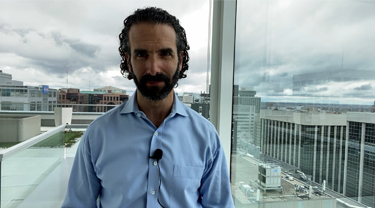Becoming an entrepreneur wasn’t something that Cyril Owona had always envisioned for himself: “When I entered the workforce, I was focused on having a standard career with a steady salary. In my last role, the company I worked for was having resource issues for several positions. I ended up finding myself becoming an intrapreneur, where I oversaw multiple projects and quickly became highly skilled in several areas,” recalls Cyril.
A short time later, Cyril’s former employer was in the process of being acquired, and it was this moment that gave him the encouragement he needed to start his own business. “Instead of having to join a new firm and start over again—and having to prove myself by working my way up from the bottom—I figured I would take this opportunity to start my own business, where I can take the knowledge and experience I acquired over the years and apply it to my own venture.”
In 2016, Cyril founded Innova Services-Conseils International Inc. (ISCI Inc.), a consulting firm that offers its services to a variety of businesses, many of which are in the IT sector. The company provides businesses with logistical services such as project management, business analytics and intelligence, quality assurance as well as big data. ISCI provides services to clients across Canada and internationally.
Overcoming barriers
Starting a company with such a vast service offering didn’t come without its set of obstacles. In the early stages of ISCI, Cyril used his personal network to get his initial commissions, allowing his business to get the push it needed to take off. However, as his business continued to grow, Cyril wanted to expand his technology products and services to better meet the high demand. This was where he was met with the challenge of receiving funding from the banks, a process that would end up taking years to complete. “When looking at my situation in a traditional sense, it was difficult to understand why there was such a delay in obtaining financing…,” explains Cyril. “…Our business sales were consistently increasing (around 90% to 100% year-over-year), and we were never at a loss.”
Another challenge that Cyril overcame was the difference in cultures when it came to doing business in Africa. When looking to grow ISCI in Africa, it was important to Cyril that he took the time to learn about the culture and business environment of each country. He understood that cultural practices varied from country to country and to be successful, he would have to adapt. “I think this can be a challenge for some companies who look to expand into Africa. Some think that Africa is one big country, but that’s not the case. Each country in Africa has its unique customs and business practices.”
How EDC helped
While searching for different financing options, Cyril found Export Development Canada. He was first introduced to EDC’s services through an event held by Export Québec (now operating under Investissement Québec). The organization, with which EDC is a close partner, is dedicated to the promotion of Quebec’s economic development and helping businesses find the financial solutions they need to grow. Cyril was put into contact with Bruno Soares, EDC’s senior account manager for the Quebec region, who supported Cyril in his initial plans to expand his business. Bruno was able to determine the best product to meet Cyril’s needs, which was EDC’s Export Guarantee Program. This program allowed Cyril to obtain a guarantee on the loan given to him by his financial institution, and in turn, receive the working capital he needed to expand his service offerings and pursue his business plans.
“EDC helped me in terms of providing resources and knowledge. Bruno introduced me to his partners in the banking sector, which led me to becoming a client of one of those financial institutions. EDC also helped me better understand how to promote my business abroad and gave me the knowledge I needed to expand to new markets.” – Cyril Owona, President and CEO of ISCI Inc.
It’s through partnerships with organizations, like Investissement Québec and Canadian financial institutions, that EDC can help companies such as ISCI navigate the world of exporting and receive the funding they need to achieve their goals.
Advice for entrepreneurs
For Canadians looking to expand their business internationally, Cyril recommends that they join local trade associations and participate in trade missions to better understand the trade environment of the region they are looking to enter. Participating in trade missions also gives entrepreneurs the opportunity to learn from each other and share the challenges that they encounter in their trade journey. Cyril also advises that “…when it comes to doing business in Africa, or anywhere else, don’t rely on what you read or what you watch on TV. It’s more valuable to have your own experiences by being on the ground and experiencing the culture firsthand.” In other words, don’t enter a country with your own preconceived notions. Take the time to immerse yourself in the new culture, because what might be customary at home in Canada, might not be abroad.
With business going strong over the last six years, there’s no slowing down for ISCI. The company will improve its internal services to better serve its clients in Quebec. In addition to this, Cyril plans to focus on acquiring more international clients in Africa’s French-speaking regions, and further plant roots in the region by opening an office in Cameroon, his native country. He mentions that “having an international mandate is something that ISCI plans to maintain over the coming years and we plan to continuously adapt to the needs of our clients.”





